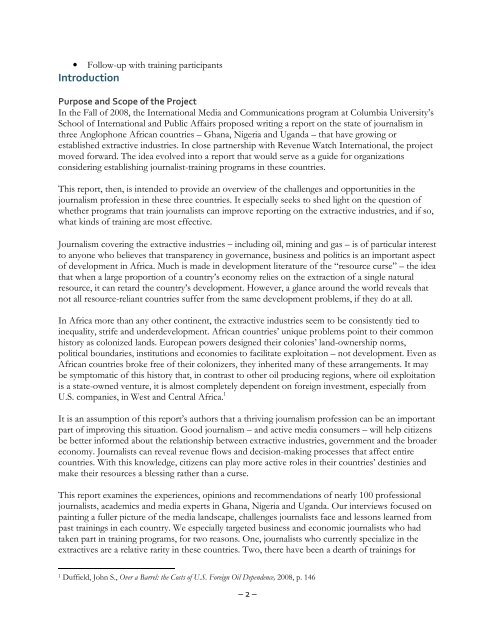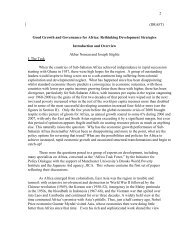• Follow-up with training participantsIntroductionPurpose and Scope of the ProjectIn the Fall of 2008, the International Media and Communications program at Columbia University’sSchool of International and Public Affairs proposed writing a report on the state of journalism inthree Anglophone African countries – Ghana, Nigeria and Uganda – that have growing orestablished extractive industries. In close partnership with Revenue Watch International, the projectmoved <strong>for</strong>ward. The idea evolved into a report that would serve as a guide <strong>for</strong> organizationsconsidering establishing journalist-training programs in these countries.This report, then, is intended to provide an overview of the challenges and opportunities in thejournalism profession in these three countries. It especially seeks to shed light on the question ofwhether programs that train journalists can improve reporting on the extractive industries, and if so,what kinds of training are most effective.Journalism covering the extractive industries – including oil, mining and gas – is of particular interestto anyone who believes that transparency in governance, business and politics is an important aspectof development in Africa. Much is made in development literature of the “resource curse” – the ideathat when a large proportion of a country’s economy relies on the extraction of a single naturalresource, it can retard the country’s development. However, a glance around the world reveals thatnot all resource-reliant countries suffer from the same development problems, if they do at all.In Africa more than any other continent, the extractive industries seem to be consistently tied toinequality, strife and underdevelopment. African countries’ unique problems point to their commonhistory as colonized lands. European powers designed their colonies’ land-ownership norms,political boundaries, institutions and economies to facilitate exploitation – not development. Even asAfrican countries broke free of their colonizers, they inherited many of these arrangements. It maybe symptomatic of this history that, in contrast to other oil producing regions, where oil exploitationis a state-owned venture, it is almost completely dependent on <strong>for</strong>eign investment, especially fromU.S. companies, in West and Central Africa. 1It is an assumption of this report’s authors that a thriving journalism profession can be an importantpart of improving this situation. Good journalism – and active media consumers – will help citizensbe better in<strong>for</strong>med about the relationship between extractive industries, government and the broadereconomy. Journalists can reveal revenue flows and decision-making processes that affect entirecountries. With this knowledge, citizens can play more active roles in their countries’ destinies andmake their resources a blessing rather than a curse.This report examines the experiences, opinions and recommendations of nearly 100 professionaljournalists, academics and media experts in Ghana, Nigeria and Uganda. Our interviews focused onpainting a fuller picture of the media landscape, challenges journalists face and lessons learned frompast trainings in each country. We especially targeted business and economic journalists who hadtaken part in training programs, <strong>for</strong> two reasons. One, journalists who currently specialize in theextractives are a relative rarity in these countries. Two, there have been a dearth of trainings <strong>for</strong>1 Duffield, John S., Over a Barrel: the Costs of U.S. Foreign Oil Dependence, 2008, p. 146– 2 –
journalists in these countries that focus exclusively on the extractives. We felt that findings onbusiness journalism could easily be applied to journalism on the extractives. Indeed, in countries likeNigeria, it is impossible to cover the economy without covering the extractives.Much has been written about the challenges facing journalists in the countries we visited. Ourresearch, we believe, has refreshed that knowledge and deepened it with personal accounts frompeople in the industry. What is unique to our project is our canvassing of journalist trainingprograms in Ghana, Nigeria and Uganda, an ef<strong>for</strong>t that has not, to our knowledge, been previouslyattempted.We wish to be extremely careful when speaking about the findings of this report in a general sense.A common fallacy in much writing about Africa is the tendency to generalize about countries acrossthe continent. The three countries in our study have distinct histories and political and economicclimates. There are huge differences in the size of each country’s populations and in the specifichurdles each faces in achieving development goals. In fact, the countries do not even necessarilyshare all the same goals.The countries do have some things in common. Ghana, Nigeria and Uganda are all English-speakingAfrican countries whose extractive industries <strong>for</strong>m an important part of their respective economies.The United Nations Development Program’s Human Development Report of 2007/2008categorizes all three as low developed countries. 2 Other than these similarities, there are large andimportant differences between the countries’ contexts.MethodologyA team of six students and one professor conducted the research over the course of the winter andspring of 2009. One student each traveled to Ghana and Uganda, while four traveled to Nigeria,which has by far the largest population, extractive industry and media industry of the threecountries. Researchers visited Ghana, Uganda and Nigeria <strong>for</strong> two weeks in January 2009, and madea second trip to Nigeria <strong>for</strong> two weeks in March 2009.Researchers used standardized interview <strong>for</strong>mats <strong>for</strong> most interviewees. There were differentquestions <strong>for</strong> journalists who had reported on the extractive industries and <strong>for</strong> those who had not,and a separate set of questions <strong>for</strong> editors. Questions were divided into two main categories:challenges that journalists face in their jobs, and their reflections on training programs in which theyhad participated. Interview questions are attached to this report in Appendix D.These standardized interviews lasted between 45 minutes and an hour and a half each. Researchesconducted most interviews at the offices of publications and media outlets. We made an ef<strong>for</strong>t,however, to avoid interviewing journalists in the presence of superiors, as we felt this couldinfluence their answers. We conducted some interviews by international phone calls, and wherepossible we have indicated this in the report. Please note that interviewee quotes are presented inseveral different ways throughout this report. Some journalists and professionals agreed to beinterviewed only on the condition that their names are kept confidential. Thus we have named someinterviewees but given general descriptions to others.2 United Nations Development Program Human Development Report 2007/2008, http://hdrstats.undp.org/indicators/1.html.– 3 –
- Page 1 and 2: THEREWILLBE INKA study of journalis
- Page 3 and 4: AcknowledgementsThis paper has bene
- Page 7: Executive SummaryPurpose of the Rep
- Page 11 and 12: Existing International Training Opp
- Page 13 and 14: • Consumer Affairs and Informatio
- Page 15 and 16: Background 3Of the three countries
- Page 17 and 18: pervasive conflict in the Niger Del
- Page 19 and 20: 3) Crises or disruptions, where som
- Page 21 and 22: Low pay and low regardOne of the mo
- Page 23 and 24: Even in cases where working journal
- Page 25 and 26: But while some reporters think FOIB
- Page 27 and 28: When asked how much the media could
- Page 29 and 30: the effects of these challenges for
- Page 31 and 32: detailed analysis of the opportunit
- Page 33 and 34: journalist said he has, however,
- Page 35 and 36: completely make use of some of the
- Page 37 and 38: money. Their knowledge of what medi
- Page 39 and 40: Notes on conducting research in Nig
- Page 41 and 42: Ghana- 35 -
- Page 43 and 44: evenues each year,” 106 which wou
- Page 45 and 46: entertainment news, scandals, and p
- Page 47 and 48: The rise of business-focused journa
- Page 49 and 50: coverage of the oil industry is als
- Page 51 and 52: needed supplementary income to cash
- Page 53 and 54: as supporting one political party o
- Page 55 and 56: Numerous journalists recounted how
- Page 57 and 58: Training programs available to busi
- Page 59 and 60:
Amos Safo, editor-in-chief at the p
- Page 61 and 62:
Notes on conducting research in Gha
- Page 63 and 64:
Background 136Literacy and Educatio
- Page 65 and 66:
“sufficient information” about
- Page 67 and 68:
or criminal charges for content the
- Page 69 and 70:
have such difficulty obtaining info
- Page 71 and 72:
The majority of those interviewed b
- Page 73 and 74:
commitment to their profession and
- Page 75 and 76:
Notes on Conducting Research in Uga
- Page 77 and 78:
Recommendations for Revenue Watch I
- Page 79 and 80:
people who have no journalism backg
- Page 81 and 82:
analyzes business,” he said, “e
- Page 83 and 84:
A journalist with The Punch said,
- Page 85 and 86:
The Media Foundation for West Afric
- Page 87 and 88:
Length of TrainingRoughly three-qua
- Page 89 and 90:
industries, for instance, ought to
- Page 91 and 92:
otherwise being published in the pr
- Page 93 and 94:
Non-Training Recommendations for Ug
- Page 95 and 96:
Appendix A: NigeriaPotential Partne
- Page 97 and 98:
journalists. Biakolo is very profes
- Page 99 and 100:
Television Stations• Nigerian Tel
- Page 101 and 102:
have two to four month professional
- Page 103 and 104:
City: AccraTelephone: +233 (021) 22
- Page 105 and 106:
Fax: +256 414 255 495E-mail: umdf@a
- Page 107 and 108:
• What do you think are the most
- Page 109 and 110:
Appendix E: Survey Questions1. Name
- Page 111 and 112:
18. How effective were the teaching
- Page 113 and 114:
28. What are the most important cha
- Page 115 and 116:
1. Journalists by Country2. How wou
- Page 117 and 118:
5. How often do you travel out of t
- Page 119 and 120:
9. Which organization(s) sponsored
- Page 121:
12. After completing the training(s














